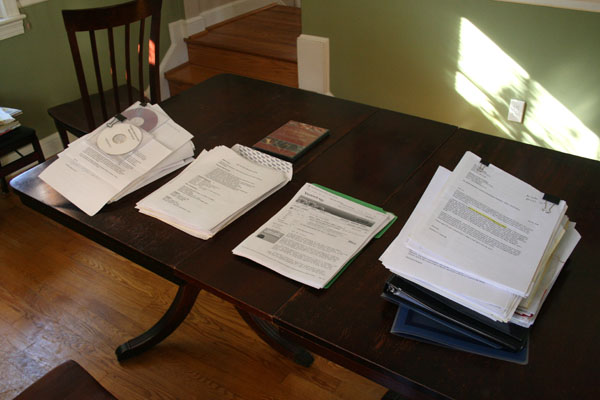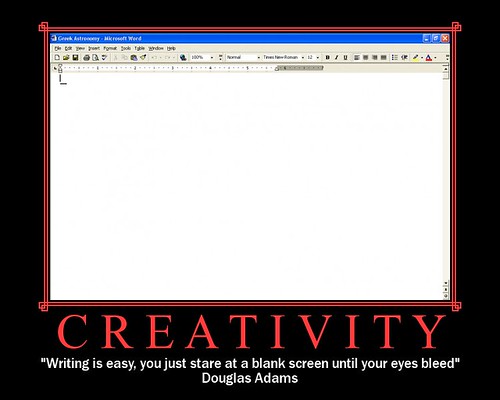
(Photo Source: andymangold)
So you have to write your personal statement, but about what exactly?
“I’m great. The End.” If it were only that easy, you wouldn’t be reading this. First things first:
Breaking Writer’s Block

(Photo Source: skidrd)
We all have it. It happens. Usually, the time we set aside to finish a task like writing a personal statement or essay isn’t the same time that our creative juices are flowing. Duly noted, now what? I go into more detail about writer’s block in How to Overcome Writer’s Block; however, now, the most important thing to do is to think about your process for writing. It is much easier to come up with ideas once you have the groundwork laid out for the structure of your personal statement.
Personal Statement Structures (Examples)
Short Narrative (Single Experience):
Now, I’m not saying you need an outline. It is always helpful, but that isn’t what I mean by structure. What I mean by structure is the angle at which you approach your writing. For instance, you can write in a narrative style about a particular situation that demonstrates your best personal and professional qualities. Maybe a company or firm you worked for, a volunteer organization or a business you started might provide a single set of succinct events that contain all the attributes you want to relay to the readers of your personal statement.
Personal Statements are short, so this approach of using a single set of interconnected events which create a concise narrative really takes full advantage of the limited space provided if done properly. This method will allow you to give interesting details about a certain experience you would otherwise not be able to tell. It is also an exceptional method for capturing a reader’s attention because inherently everyone enjoys a good story (key word being “good” in that previous sentence.) A dull story will not help you.
Brief Experience-Building Chronological Timeline (Multiple Experiences):
Sometimes, you just do not have an experience that lends itself to being made into a short daytime Made-for-TV movie like the previous example, meaning it will not translate well into a narrative about a single situation. In this case if you want to include multiple experiences in your personal statement, you should try the chronological experience-building timeline approach. Using this method, you will show the reader what led you to the path you are on now, demonstrating reasons for your intentions along the way. This timeline will not only include what you have done in the past and what you are doing now but also what you plan to do in the future with your degree while you are in school as well as after you graduate.
You will want to start with the first experience that logically began the path you are on now. You do not want to start with: “Well, I was born, and then I went to grade school, junior high, high school, had my first job, blah, blah, blah…” This is not interesting and is too much information. Your personal statement must be short and to the point.
You also do not want to restate your resume; although, using this method, it might be tempting to do so. Nevertheless, remind yourself that not everything on your curriculum vitae is relevant to the program you are applying to now. Nor does it really make clear exactly what you got out of those experiences. Using a brief experience-building timeline will not only show why you initially were interested in each step and what you got out of it but also how it led to the next logical step (aka your next experience on your chronological timeline).
So you might be asking: “Does this mean I need to include every job or experience that might have happened during that period of time?” The answer is clearly no. Realistically, for this type of personal statement, you want between two and four worthwhile experiences that transition into each other in a believable manner and all lead to where you are now in your decision to apply.
An example of this could be as follows in your brainstorming outline:
Experiences to use in personal statement about pursuing a law degree to practice intellectual property law in the maritime industry:
- Life Guarding – became interested in people’s safety swimming in the ocean at a young age because I knew someone that almost drowned (or my brother was a life guard, etc.)
- Volunteer Coast Guard – wanted to learn more about seafaring vessels while saving lives and doing my part as a volunteer.
- Sailing Club – as an undergraduate engineering student I became interested in the design of ships and their propulsion technology.
- Law Firm – as a legal assistant I worked for attorneys specializing in nautical technology patents, sparking my interest in law, and leading me down the path to becoming a lawyer to pursue intellectual property litigation in the maritime industry.
This example clearly shows the logical steps in the candidate’s path towards going to law school as well as what he wants to pursue during law school and on into his professional career afterward. Your experiences might not be as clear cut, but many scenarios can work using this method. The key is that the experiences mentioned build upon each other and lead the reader to believe not only will you be interested in the program for which you are applying but also that you have some experience in related fields.
Theme-Based Personal Statement (Multiple Experiences):
This type of personal statement is self-explanatory. It can make use of personal as well as professional experiences. They just all need to be wrapped together under one theme. There are many themes to choose from such as: personal perseverance over hardships (e.g. financial, family/friend illness or death, prejudice, handicap, etc.), focus of interest (e.g. particular hobby, volunteer work, industry, craft, idea, etc. that can be related to the program or field to which you are applying in a meaningful way), innovative thinking (i.e. how attending the program you are applying for will help you achieve creating an innovative process, device, business, etc.), and many others.
Themes do not have to have any chronological order to their events; however, you may want to organize your ideas chronologically if that makes the most sense. If not, you should order your experiences in a way that best supports your main theme.
These are just a few methods for structuring a personal statement. They are not totally exclusive to each other, and they are not an exhaustive list. They do and can overlap if the writer wishes so; however, they are a starting point for thinking about ideas to use to build your personal statement. It is kind of like creating a sketch of a painting with a pencil and then filling it in by painting over it, using the lines as a guide to get you started.












